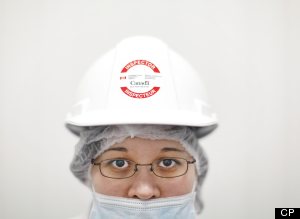The 89-year-old woman died on Aug. 25, 2008, the first victim of a listeriosis outbreak that killed 23 people, sickened thousands more and triggered the biggest food recall in Canadian history.
A government investigation determined the cause of the outbreak: tainted meat from processing giant Maple Leaf Foods. The company apologized to the victims and settled a number of lawsuits, including one brought by Clark's family, for CAD$27 million.
Following the scandal, the federal government introduced significant changes to its meat inspection program, including nearly doubling the number of inspectors from 225 to 400.
Now, however, the government has slashed the budget for the Canadian Food Inspection Agency (CFIA), the federal department responsible for food safety, by $56 million over the next three years. Hundreds of inspectors and other agency employees are scheduled to be laid off, although meat inspectors won’t be cut, Ottawa has vowed.
Karen Clark, Frances' daughter, said she was “dumbfounded.”
“I know times are tough and there are cutbacks in a lot of places, but I don’t think your food source is one of them to be chancy with,” she told The Huffington Post. “They’re just looking for another disaster.”
The full impact of the austerity budget that Parliament approved this spring won’t be felt for many years. But CFIA insiders and front-line food inspectors fear that the system, already stretched thin, will snap, threatening the safety of Canada's food and public health.
Compared to many other developed countries, Canada has emerged from the recession relatively unscathed. But after several years of stimulus spending, the Conservative government under Prime Minister Stephen Harper has committed to paying down the deficit -- an effort that critics say will necessarily involve chipping away at many public programs and services Canadians have come to take for granted.
Ottawa insists that most of the cuts to the food inspection agency will be related to administrative functions. “The government is not making any changes that would reduce the safety of Canadian food,” Agriculture Minister Gerry Ritz told HuffPost.
“No food safety-related inspectors will be declared surplus and we have not, and will not, reduce staff or cut programs that would in any way place the health and safety of Canadians at risk,” the CFIA said in a statement.
Interviews with current and former CFIA workers and the union officials who represent them tell a different story.
“If they go ahead with their plans, I have concerns,” said Bob Kingston, president of the Public Service Alliance of Canada’s Agriculture Union, which represents the agency’s front-line inspectors. “When people are run off their feet ... they have to take shortcuts or the work simply can’t get done. And that’s the situation they’re going to be in.”
Under Canada’s Constitution, the federal, provincial, territorial and municipal governments share responsibility for food safety. The CFIA, which currently employs about 3,500 front-line inspectors and inspection managers across the country, enforces all federal laws, ensures industry compliance, initiates food recalls and investigates foodborne illness outbreaks with other levels of government. There are an estimated 6.8 million cases of foodborne illness in Canada each year, though most are mild and usually result from mishandling or cross-contamination just before the food is served.
But as the 2008 listeria outbreak showed, food inspection is still a vital line of defense.
Original Article
Source: huffington post
Author: Rachel Mendleson

No comments:
Post a Comment